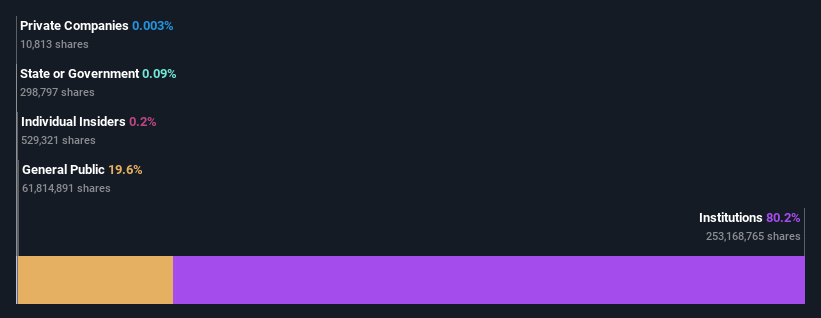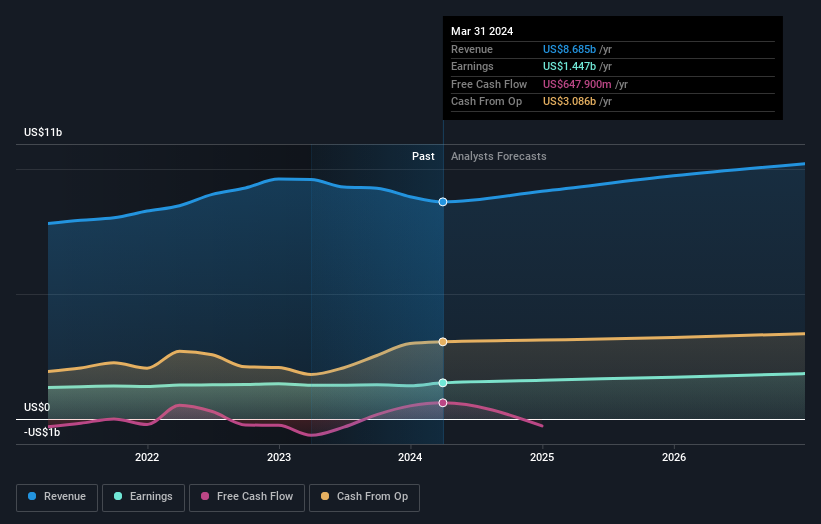Institutional owners may take dramatic actions as WEC Energy Group, Inc.'s (NYSE:WEC) recent 5.7% drop adds to one-year losses
Key Insights
Significantly high institutional ownership implies WEC Energy Group's stock price is sensitive to their trading actions
The top 20 shareholders own 50% of the company
Ownership research along with analyst forecasts data help provide a good understanding of opportunities in a stock
If you want to know who really controls WEC Energy Group, Inc. (NYSE:WEC), then you'll have to look at the makeup of its share registry. The group holding the most number of shares in the company, around 80% to be precise, is institutions. Put another way, the group faces the maximum upside potential (or downside risk).
And institutional investors saw their holdings value drop by 5.7% last week. The recent loss, which adds to a one-year loss of 3.2% for stockholders, may not sit well with this group of investors. Institutions or "liquidity providers" control large sums of money and therefore, these types of investors usually have a lot of influence over stock price movements. Hence, if weakness in WEC Energy Group's share price continues, institutional investors may feel compelled to sell the stock, which might not be ideal for individual investors.
In the chart below, we zoom in on the different ownership groups of WEC Energy Group.
See our latest analysis for WEC Energy Group
What Does The Institutional Ownership Tell Us About WEC Energy Group?
Institutional investors commonly compare their own returns to the returns of a commonly followed index. So they generally do consider buying larger companies that are included in the relevant benchmark index.
We can see that WEC Energy Group does have institutional investors; and they hold a good portion of the company's stock. This implies the analysts working for those institutions have looked at the stock and they like it. But just like anyone else, they could be wrong. If multiple institutions change their view on a stock at the same time, you could see the share price drop fast. It's therefore worth looking at WEC Energy Group's earnings history below. Of course, the future is what really matters.
Investors should note that institutions actually own more than half the company, so they can collectively wield significant power. We note that hedge funds don't have a meaningful investment in WEC Energy Group. The Vanguard Group, Inc. is currently the largest shareholder, with 13% of shares outstanding. In comparison, the second and third largest shareholders hold about 9.2% and 7.1% of the stock.
Looking at the shareholder registry, we can see that 50% of the ownership is controlled by the top 20 shareholders, meaning that no single shareholder has a majority interest in the ownership.
While studying institutional ownership for a company can add value to your research, it is also a good practice to research analyst recommendations to get a deeper understand of a stock's expected performance. Quite a few analysts cover the stock, so you could look into forecast growth quite easily.
Insider Ownership Of WEC Energy Group
The definition of an insider can differ slightly between different countries, but members of the board of directors always count. The company management answer to the board and the latter should represent the interests of shareholders. Notably, sometimes top-level managers are on the board themselves.
Most consider insider ownership a positive because it can indicate the board is well aligned with other shareholders. However, on some occasions too much power is concentrated within this group.
Our most recent data indicates that insiders own less than 1% of WEC Energy Group, Inc.. As it is a large company, we'd only expect insiders to own a small percentage of it. But it's worth noting that they own US$44m worth of shares. In this sort of situation, it can be more interesting to see if those insiders have been buying or selling.
General Public Ownership
The general public-- including retail investors -- own 20% stake in the company, and hence can't easily be ignored. While this size of ownership may not be enough to sway a policy decision in their favour, they can still make a collective impact on company policies.
Next Steps:
While it is well worth considering the different groups that own a company, there are other factors that are even more important. Take risks for example - WEC Energy Group has 2 warning signs (and 1 which is a bit concerning) we think you should know about.
If you are like me, you may want to think about whether this company will grow or shrink. Luckily, you can check this free report showing analyst forecasts for its future.
NB: Figures in this article are calculated using data from the last twelve months, which refer to the 12-month period ending on the last date of the month the financial statement is dated. This may not be consistent with full year annual report figures.
Have feedback on this article? Concerned about the content? Get in touch with us directly. Alternatively, email editorial-team (at) simplywallst.com.
This article by Simply Wall St is general in nature. We provide commentary based on historical data and analyst forecasts only using an unbiased methodology and our articles are not intended to be financial advice. It does not constitute a recommendation to buy or sell any stock, and does not take account of your objectives, or your financial situation. We aim to bring you long-term focused analysis driven by fundamental data. Note that our analysis may not factor in the latest price-sensitive company announcements or qualitative material. Simply Wall St has no position in any stocks mentioned.

 Yahoo Finance
Yahoo Finance 

